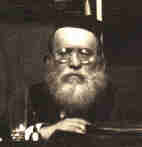 |
Hadrash Ve-haiyun
|
 |
Hadrash Ve-haiyun
|
5761
Lech Lecha
To Dedicate Please Contact Hadrash Ve-Haiyun
And Hashem said to Avram go for yourself
form your land, from your birthplace and from your fathers house
to the land that I will show you.
(Bereishis 12:1)
The simple interpretation of this posuk is that Hashem instructed Avram to depart from his immediate physical surroundings and travel to a land that was yet to be determined. However, if this is the correct interpretation we may ask two questions. First, when describing one’s departure from a physical location it is logical to first mention the local surroundings and then mention the more general area. For example, one first leaves his home, then his street, then his city and finally his country. However, here in the posuk the order is reversed. First, Hashem instructs Avram to leave his land, which is the most general. Then Hashem instructs him to leave his birthplace and finally the most local of them all, his home. The second question is why did Hashem omit the precise destination and only describe it as “the land that I will show you.”
Perhaps we may answer both questions by suggesting that Hashem did not instruct Avram to actually leave a physical location but rather commanded Avram to remove himself from the secular influences and values of his surroundings. In addition to this instruction, Hashem also gave Avram a plan on how to do so. The plan was to first focus on what was less difficult and eventually tackle what is more difficult. A person is under different degrees of influence from his surroundings. The most powerful influences are those found in the home. The next most powerful are those found in the community and finally the weakest but yet significant influences are those values found within the land. Here, Hashem instructs Avram to depart from these influences in stages. First separate from those of the land; next tackle the more difficult influences of the town, i.e., birthplace, and finally after having accomplishing this then you may concentrate on the most difficult of all, that of your family.
Now that we have explained that Hashem was not commanding Avram to take a physical journey but rather a spiritual one, we can understand why Hashem did not define a precise destination. The ultimate destination in spiritual matters is not defined. It depends on the degree of spirituality that one strives to attain. The posuk states, “to the land that I will show you.” The more effort one exerts in the spiritual realm the further one will travel and the more he will merit to see, i.e., perceive an understanding of Hashem, the less effort one puts into spiritual matters, the shorter the trip and the less he will see. In addition, we may also translate the Hebrew word at the conclusion of the posuk “arechah” not as “that I will show you” but rather “I will show Myself to you.” Hashem said to Avram that by removing himself from the false values and influences of society, he and his descendents will merit to have a land where Hashem will show Himself to his people, i.e. a land where the presence of Hashem will be strongly felt.